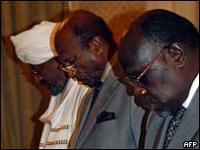







|
News and Information
Sudan swears in unity government
| September 22, 2005 |

Ministers being sworn in
The ministers were urged to make a united Sudan 'attractive'
Sudan's first post-war national unity government has been sworn in, as part of a deal signed with former southern rebels to end 21 years of war.
Nine former SPLM rebels pledged to work with 16 members of the government they had been fighting until January.
The inauguration was delayed by a row over who runs the energy portfolio, with control of the vital oil industry.
The BBC's Jonah Fisher in Khartoum says many southerners are unhappy that key ministries remain in northern hands.
He says this is a large government with a huge task, delivering peace and prosperity to a country with a long history of civil war.
US President George W Bush hailed the formation of the government.
"All Sudanese can be proud of this significant progress, because it demonstrates the parties' continued commitment to a common vision of a unified, democratic, prosperous, and peaceful Sudan," he said in a statement.
Not united
The theme of unity was also emphasised by President Omar al-Bashir after the ceremony.
"The primary duty of all those in government ought to be ensuring that national unity is an attractive option," he said.
New Foreign Minister Lam Akol
Lam Akol becomes the first foreign minister from the south
His National Congress Party retains the energy, defence, interior and finance posts.
Sudan's next foreign minister, Lam Akol, comes from the SPLM.
Two seats have been left vacant for members of the northern opposition National Democratic Alliance, which is unhappy at the allocation of seats.
"The so-called national unity government does not deserve this name," Islamist leader Hassan al-Turabi, who was freed in June from 15 months in detention, told the Al-Sahafa newspaper.
The number of ministers each side names was set out in January's deal - with the NPC getting 52% and the SPLM 28%.
The recent death of vice-president and ex-rebel leader John Garang also delayed the north-south peace process.
The peace deal does not affect the separate conflict in the western region of Darfur, where rebels continue to clash with the army and pro-government militias.
Oil revenue shared
Our correspondent says the biggest disappointment for the southern Sudanese is that they have not been given the energy and mining ministry which includes the oil sector.
He says it appears Mr Garang's successor and the country's first Vice-President Salva Kiir backed down at the last moment to get the government going.
Sudan President Omar al-Bashir
President Bashir came to power in an Islamist-backed coup in 1989
Under the terms of the peace agreement, oil revenue will be split 50-50 with the north but most of the proven reserves are in the south.
Nine months ago a peace agreement was signed between the SPLM and the NCP.
It ended two decades of civil war and paved the way for this power-sharing government.
The civil war pitted the Muslim north against Christians and animists in the south, leaving some 1.5 million people dead.
The south is due to hold a referendum on secession in six years' time. |
Source: www.bbc.com |
| http://news.bbc.co.uk/2/hi/africa/4266872.stm |
|
| Support Caprivi Freedom |
Fill out the form below to become a member of this site and receive our regular newsletter.
|

|

